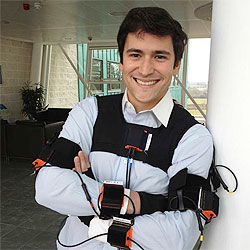Recent Stories
- Businesses urged to tap into science and technology young talent
- Digital relay baton enables remote crowd cheering of athletes
- Health Innovation Campus moves a step closer
- £7.1 million R&D boost for North West businesses
- Centre of excellence created for the next industrial revolution
- Artificial intelligence toolkit spots new child sexual abuse media online
- Strategic partnership set to help plug cyber security skills gap
- What your choice of smartphone says about you
- InfoLabTree: Discover the Story
- novi.digital Launch Event - 'An Event to Help Businesses Grow Online'
RSS Feeds
RSS feeds can deliver the latest InfoLab21 news and events direct to your browser without you having to visit the website.
In most browsers you can click on an RSS link and choose to subscribe to the feed to add it to your favourites or bookmarks.
New Kit Pumps up 3-D Feedback
Story supplied by LU Press Office
 Eduardo Velloso from the School of Computing and Communications
Eduardo Velloso from the School of Computing and Communications
A brand new computer system which provides 3-D feedback on weightlifting performance will now be taken to another level by a Lancaster University scientist.
Eduardo Velloso, a second year PhD student at the University's School of Computing and Communications, featured recently in the New Scientist magazine for his innovative work, now plans to link computers with emotions.
Eduardo, from Rio de Janeiro, presented his innovative weightlifting feedback system to the Augmented Human Conference in Stuttgart, an international conference which highlights new scientific technologies geared at increasing human capabilities.
And it was there that Eduardo's work-out innovation caught the eye of New Scientist journalists.
The computerised kit, the first of its kind, provides intricate information on a weightlifter's performance ensuring, for the first time, that advice on technique is instantly and accurately monitored and relayed in real-time.
The sophisticated system uses a Microsoft Kinect depth camera to monitor 3-D movement and an LCD display to indicate if the weightlifter is undertaking the moves in the right way, position and speed. Tests showed a significant improvement in weightlifting performance.
Eduardo came to Lancaster University, his number one choice for computing studies, as a research associate in February 2011 and started his PhD that September. He worked closely throughout the project with his PhD supervisor Professor Hans Gellersen and a former Lancaster University research associate, Andreas Bulling.
"For most of my first year I worked on the weightlifting project to analyse movement and provide sophisticated feedback," said Eduardo. "We picked weightlifting because it is an activity with specific movement."
Now Eduardo, a computer engineering graduate of the Pontifical Catholic University of Rio de Janeiro (PUC Rio), plans to tackle another breakthrough pioneering project with the help of a Faculty scholarship.
"I have moved on from weightlifting but will still be analysing movement," explained Eduardo, who came to Lancaster University on the recommendation of Alessandro Garcia, a Professor at PUC Rio, who was a lecturer at Lancaster University previously.
"By tracking a person's movement I want to understand the emotions the person is experiencing. This is in its very early stages. My goal is to deduce affective states of mind from body language. This involves psychological behavioural research and affective computing. It's a very interesting topic. Computers understanding emotions will be amazing.
"Previous work in emotion recognition has focused on facial and voice recognition. We are now trying to do this by looking as users' bodily expressions. We could use this method in systems to help users in improving their body language for specific situations such as a job interviews or public speaking."
Tue 09 April 2013



